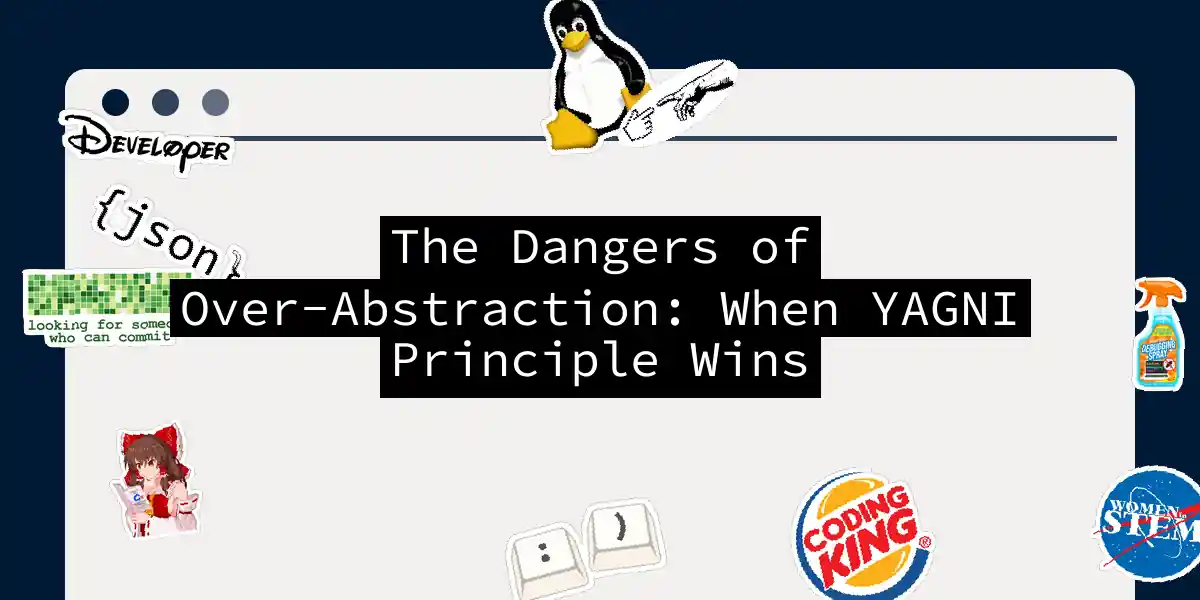The Dangers of Over-Abstraction: When YAGNI Principle Wins
In the world of software development, principles like YAGNI (You Ain’t Gonna Need It) are often discussed, but rarely fully understood. YAGNI is more than just a catchy acronym; it’s a guiding light in the dark forest of over-engineering and unnecessary complexity. Today, we’re going to delve into the dangers of over-abstraction and why following the YAGNI principle can be a lifesaver.
The YAGNI Principle: A Brief Introduction
YAGNI, a mantra from Extreme Programming, advises developers to avoid implementing features or abstractions that are not immediately necessary. This principle is not about being lazy or avoiding work; it’s about being smart and efficient. It’s the difference between building a house with just the right number of rooms versus constructing a mansion with rooms you might never use.
The Pitfalls of Over-Abstraction
Over-abstraction is the enemy of simplicity and maintainability. When you abstract too much, you create a complex web of code that is hard to understand, harder to maintain, and often more prone to errors. Here’s a simple example to illustrate this point:
# Over-abstracted example
class Calculator:
def __init__(self):
pass
def add(self, x, y):
return x + y
def subtract(self, x, y):
return x - y
def multiply(self, x, y):
return x * y
def divide(self, x, y):
if y == 0:
raise ValueError("Cannot divide by zero")
return x / y
# Using the Calculator class to add two numbers
calculator = Calculator()
result = calculator.add(2, 3)
print(result)
In this example, we’ve created a Calculator class with methods for basic arithmetic operations. While this might seem like a good idea, it’s overkill if all we need is to add two numbers. Here’s how YAGNI would approach it:
# YAGNI-compliant example
def add_two_and_three():
return 2 + 3
result = add_two_and_three()
print(result)
The YAGNI-compliant example is simpler, more direct, and easier to maintain.
Real-World Consequences
Over-abstraction can lead to several real-world issues:
Increased Development Time
When you over-abstract, you spend more time designing and implementing features that may never be used. This not only delays the delivery of your project but also increases the overall cost.
Complexity and Maintainability
Complex code is harder to understand and maintain. Imagine having to debug a deeply nested abstraction when all you need is a simple function. The complexity adds a layer of indirection that can make your codebase a nightmare to work with.
Code Smells
Over-abstraction can lead to code smells such as unnecessary complexity, tight coupling, and violation of the principle of least surprise. These smells make your codebase less maintainable and more prone to errors.
Balancing Abstraction and Simplicity
So, how do you balance the need for abstraction with the YAGNI principle? Here are some tips:
Use Abstraction Judiciously
Abstraction should simplify current needs, not just future ones. If an abstraction doesn’t make your current code simpler or more maintainable, it’s likely unnecessary.
Follow the WET Principle Temporarily
Sometimes, it’s helpful to write code that is not DRY (Don’t Repeat Yourself) initially. The WET (Write Everything Twice) principle suggests writing similar code twice before extracting a common abstraction. This helps ensure that the abstraction is truly needed and useful.
Refactor as Needed
YAGNI doesn’t mean you never refactor. It means you refactor when it’s necessary. If you find yourself repeating code or if an abstraction becomes clear after writing the code, then it’s time to refactor.
A Practical Example
Let’s consider a scenario where you’re building a simple e-commerce application. You need to calculate the total cost of an order.
# Initial implementation without abstraction
def calculate_order_total(order):
total = 0
for item in order:
total += item['price'] * item['quantity']
return total
# Later, you realize you need to calculate the total cost with tax
def calculate_order_total_with_tax(order, tax_rate):
total = 0
for item in order:
total += item['price'] * item['quantity']
return total + (total * tax_rate)
# Over-abstracted example
class OrderCalculator:
def __init__(self, tax_rate=0):
self.tax_rate = tax_rate
def calculate_total(self, order):
total = 0
for item in order:
total += item['price'] * item['quantity']
if self.tax_rate > 0:
total += total * self.tax_rate
return total
# YAGNI-compliant example
def calculate_order_total(order):
total = 0
for item in order:
total += item['price'] * item['quantity']
return total
def calculate_order_total_with_tax(order, tax_rate):
total = calculate_order_total(order)
return total + (total * tax_rate)
In the YAGNI-compliant example, we start with a simple function to calculate the order total. When the need for calculating the total with tax arises, we add a new function that builds upon the existing one. This approach avoids unnecessary complexity and keeps the code simple and maintainable.
Diagram: Over-Abstraction vs YAGNI
Here is a sequence diagram illustrating the difference between over-abstraction and following the YAGNI principle:
Conclusion
The YAGNI principle is not about avoiding abstraction altogether; it’s about using abstraction wisely. By following YAGNI, you ensure that your codebase remains simple, maintainable, and efficient. Remember, it’s always better to err on the side of simplicity and refactor as needed, rather than over-engineering and complicating your code unnecessarily.
In the words of the wise, “Keep it simple, stupid” (KISS). Sometimes, the simplest solutions are the best, and YAGNI helps you stick to that simplicity while still allowing for growth and evolution of your codebase.
So the next time you’re tempted to build that grand, abstract framework, take a step back and ask yourself: “Do I really need this?” If the answer is no, then maybe you ain’t gonna need it after all.
